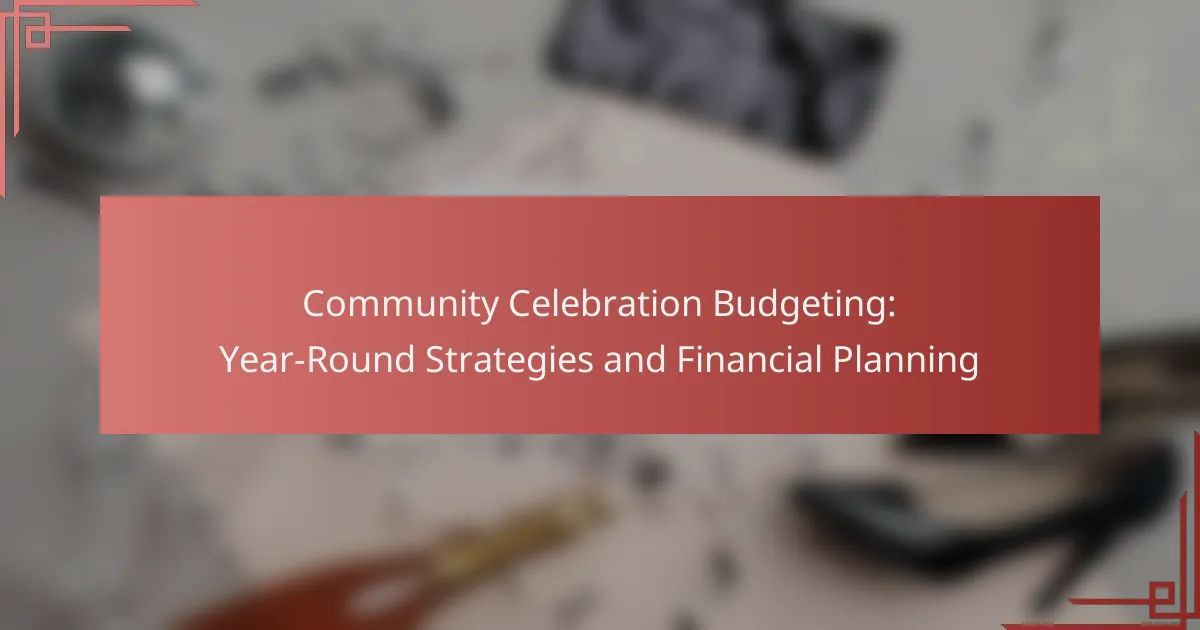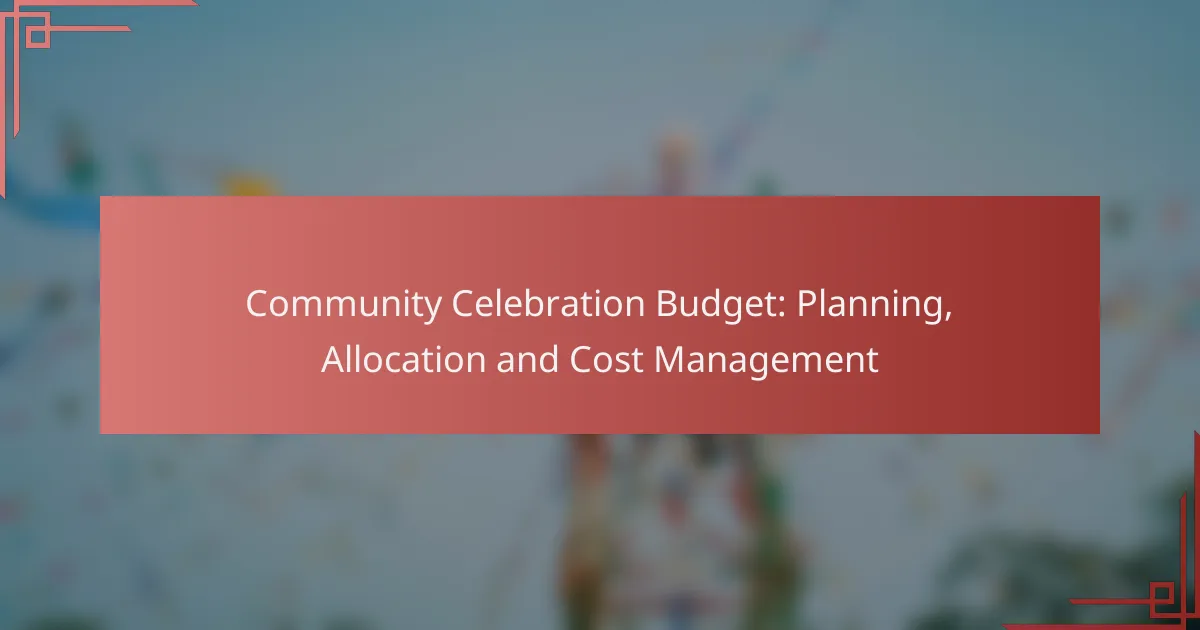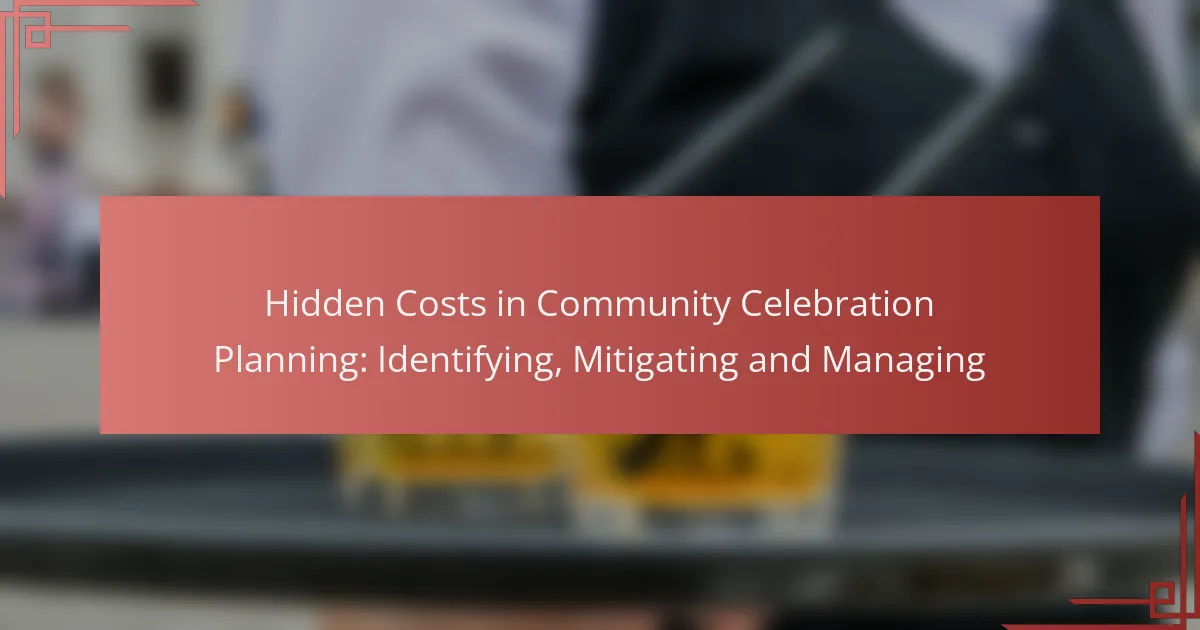Effective budgeting for community celebrations is essential for ensuring financial viability and successful planning. By outlining expected costs and potential income, communities can avoid overspending and engage members in the process. Year-round strategies, including consistent monitoring and diverse funding sources, help maintain a stable financial foundation for these events.
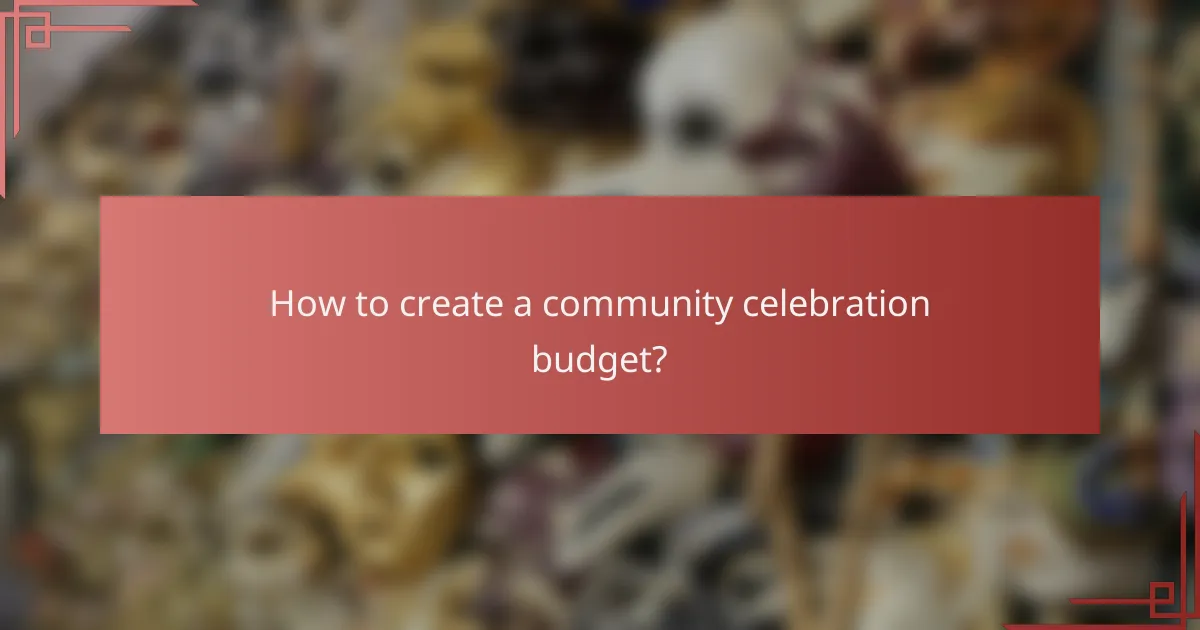
How to create a community celebration budget?
Creating a community celebration budget involves outlining expected costs and potential income to ensure the event is financially viable. A well-structured budget helps in planning effectively and avoiding overspending.
Define event goals and objectives
Clearly defining the goals and objectives of your community celebration is essential for effective budgeting. Consider what you want to achieve, such as fostering community spirit, raising funds for a cause, or celebrating a local tradition.
Setting specific objectives allows you to allocate resources more effectively. For instance, if the goal is to attract families, you might prioritize kid-friendly activities and entertainment.
Identify potential expenses
Identifying potential expenses is crucial for creating a realistic budget. Common costs include venue rental, permits, catering, entertainment, marketing, and supplies.
Make a comprehensive list of all possible expenses, and consider including a contingency fund of around 10-15% of the total budget to cover unexpected costs.
Estimate revenue sources
Estimating revenue sources helps balance your budget. Potential income can come from ticket sales, sponsorships, vendor fees, donations, and merchandise sales.
Research local sponsorship opportunities and consider tiered sponsorship levels to attract businesses of various sizes. This can significantly enhance your funding potential.
Allocate funds to each category
Once you have identified expenses and potential revenue, allocate funds to each budget category based on priority and necessity. Ensure that essential costs, like permits and venue fees, are covered first.
Use a spreadsheet to track allocations and adjust as necessary. This visual representation can help you see where funds are concentrated and where adjustments may be needed.
Review and adjust budget regularly
Regularly reviewing and adjusting your budget is vital for staying on track. Set specific times to review the budget, such as monthly or quarterly, depending on the event timeline.
Be prepared to make adjustments based on actual expenses and income. If certain areas are over or under budget, reallocate funds as needed to ensure the overall financial health of the celebration.

What are effective year-round budgeting strategies?
Effective year-round budgeting strategies involve consistent monitoring and adjustment of financial plans to ensure community celebrations remain within budget. By implementing structured reviews and utilizing appropriate tools, communities can better manage their resources and engage members in the planning process.
Implement monthly budget reviews
Monthly budget reviews are essential for tracking expenses and income related to community celebrations. These reviews allow organizers to identify any discrepancies between planned and actual spending, enabling timely adjustments to stay on track.
During these reviews, consider comparing actual expenditures against your budgeted amounts. This practice helps in recognizing patterns, such as overspending in specific areas, and allows for reallocating funds as necessary. Aim to set aside a specific time each month for this review to maintain consistency.
Utilize budgeting software like QuickBooks
Using budgeting software such as QuickBooks can streamline the financial management process for community celebrations. These tools offer features like expense tracking, reporting, and forecasting, which can simplify budgeting tasks.
Consider setting up categories for different celebration expenses, such as venue rental, catering, and entertainment. This categorization helps in monitoring spending trends and making informed decisions. Many budgeting software options also allow for collaboration, making it easier to involve team members in financial planning.
Engage community members in planning
Engaging community members in the budgeting and planning process fosters a sense of ownership and accountability. When members contribute their ideas and feedback, it can lead to more innovative and cost-effective solutions for community celebrations.
Host regular meetings or workshops where members can discuss budget priorities and suggest fundraising ideas. This collaborative approach not only enhances transparency but also encourages participation, which can lead to increased support and resources for the events.
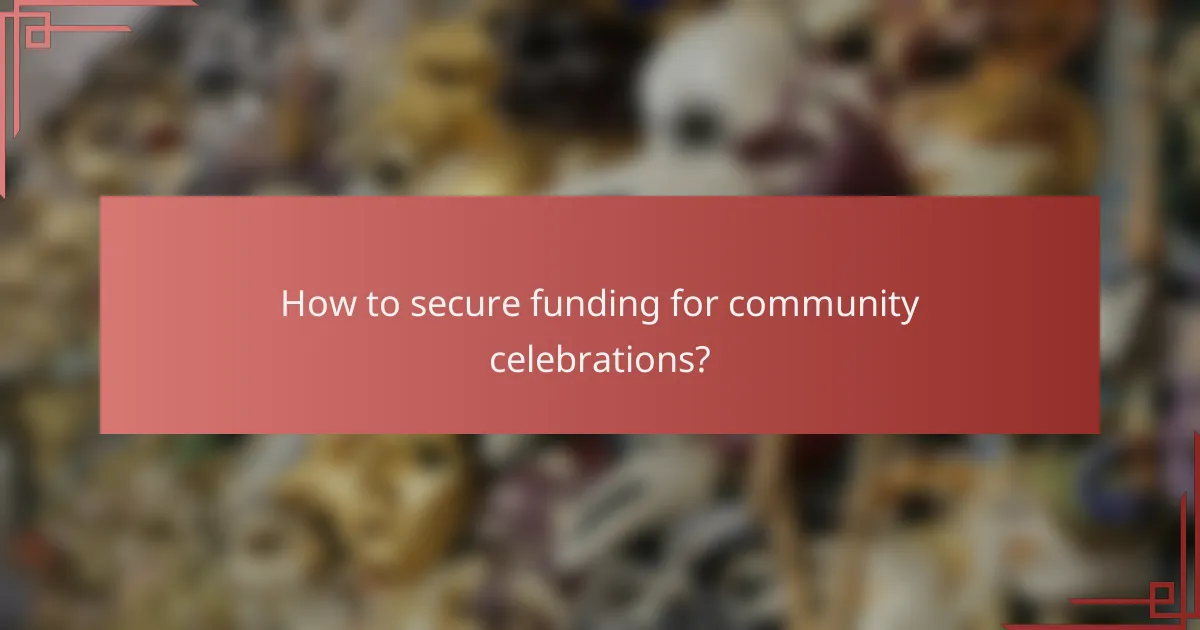
How to secure funding for community celebrations?
Securing funding for community celebrations involves identifying various sources such as grants, partnerships, and fundraising activities. By diversifying funding streams, communities can ensure a more stable financial foundation for their events.
Apply for local grants
Local grants are a vital resource for funding community celebrations. Many municipalities and nonprofit organizations offer grants specifically aimed at supporting community events, which can cover costs like permits, equipment, and promotional materials.
To apply, research available grants in your area, paying attention to eligibility criteria and deadlines. Prepare a clear proposal outlining your event’s goals, budget, and community impact to increase your chances of approval.
Partner with local businesses
Forming partnerships with local businesses can provide both financial support and in-kind contributions for community celebrations. Businesses often seek opportunities to enhance their visibility and engage with the community, making them ideal partners.
Consider approaching businesses for sponsorships or donations in exchange for advertising at the event. Create a sponsorship package detailing the benefits for businesses, such as logo placement and promotional opportunities, to encourage participation.
Organize fundraising events
Fundraising events are an effective way to generate funds for community celebrations while engaging the community. Activities like bake sales, charity runs, or auctions can attract participation and donations.
When planning a fundraising event, set clear financial goals and promote the event widely through social media and local networks. Ensure the event is enjoyable and accessible to maximize attendance and contributions.

What are common budgeting pitfalls to avoid?
Common budgeting pitfalls include underestimating costs, neglecting contingency funds, and failing to track expenses. Avoiding these issues can help ensure that your community celebration remains financially viable and successful.
Underestimating costs
Underestimating costs is a frequent mistake that can derail a community celebration budget. It’s essential to consider all potential expenses, including venue rental, permits, catering, entertainment, and marketing. A good rule of thumb is to add 10-20% to your initial estimates to account for unforeseen expenses.
To avoid this pitfall, break down each category of spending and research average costs in your area. For example, if hiring a local band typically ranges from $500 to $2,000, use this range to inform your budget rather than assuming a flat rate.
Neglecting contingency funds
Neglecting to set aside contingency funds can leave your budget vulnerable to unexpected costs. A contingency fund should ideally be around 10% of your total budget, providing a financial cushion for emergencies or last-minute changes. This practice helps ensure that your celebration can proceed smoothly, even if surprises arise.
When planning, explicitly allocate a portion of your budget for contingencies. This way, you can avoid scrambling for funds if an unforeseen expense occurs, such as needing additional permits or equipment rentals.
Failing to track expenses
Failing to track expenses can lead to overspending and financial mismanagement. Regularly monitoring your expenditures against your budget helps identify areas where you might be going over budget and allows for timely adjustments. Use spreadsheets or budgeting software to keep a detailed record of all transactions.
Establish a routine for reviewing your budget, such as weekly or bi-weekly check-ins. This practice not only keeps you informed but also helps you stay accountable to your financial goals, ensuring that your community celebration remains within budget.
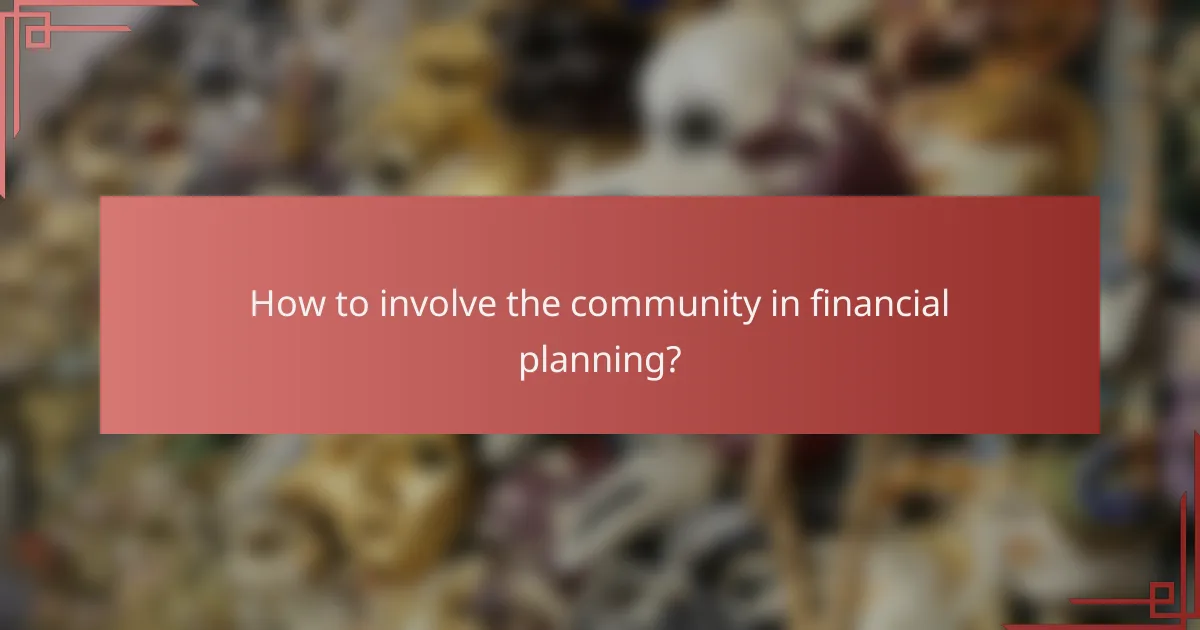
How to involve the community in financial planning?
Involving the community in financial planning fosters transparency and builds trust. Engaging residents in the budgeting process can lead to more effective allocation of resources and increased satisfaction with community events.
Conduct surveys for input
Surveys are an effective way to gather community feedback on financial priorities. They can be distributed online or in-person, allowing residents to express their views on budget allocations for various events. Consider using platforms like Google Forms or SurveyMonkey for easy access and analysis.
When designing surveys, keep questions clear and concise. Aim for a mix of multiple-choice and open-ended questions to capture both quantitative and qualitative data. Offering incentives, such as small prizes, can also boost participation rates.
Host community meetings
Community meetings provide a platform for direct dialogue between residents and planners. These gatherings can be held quarterly or biannually to discuss budget proposals and gather real-time feedback. Ensure meetings are accessible, both in terms of location and timing, to encourage diverse attendance.
During these meetings, present budget outlines and allow ample time for questions and discussions. Use visual aids like charts or slides to illustrate financial data clearly. This approach not only informs but also empowers residents to voice their opinions and suggestions.
Share budget updates transparently
Regularly sharing budget updates fosters a culture of transparency and accountability. Create a dedicated section on the community website or utilize social media platforms to post updates on budget changes, expenditures, and upcoming financial decisions.
Consider using infographics to simplify complex financial information. Regular newsletters can also serve as a tool to keep residents informed and engaged. Transparency helps build trust and encourages ongoing community involvement in financial planning.
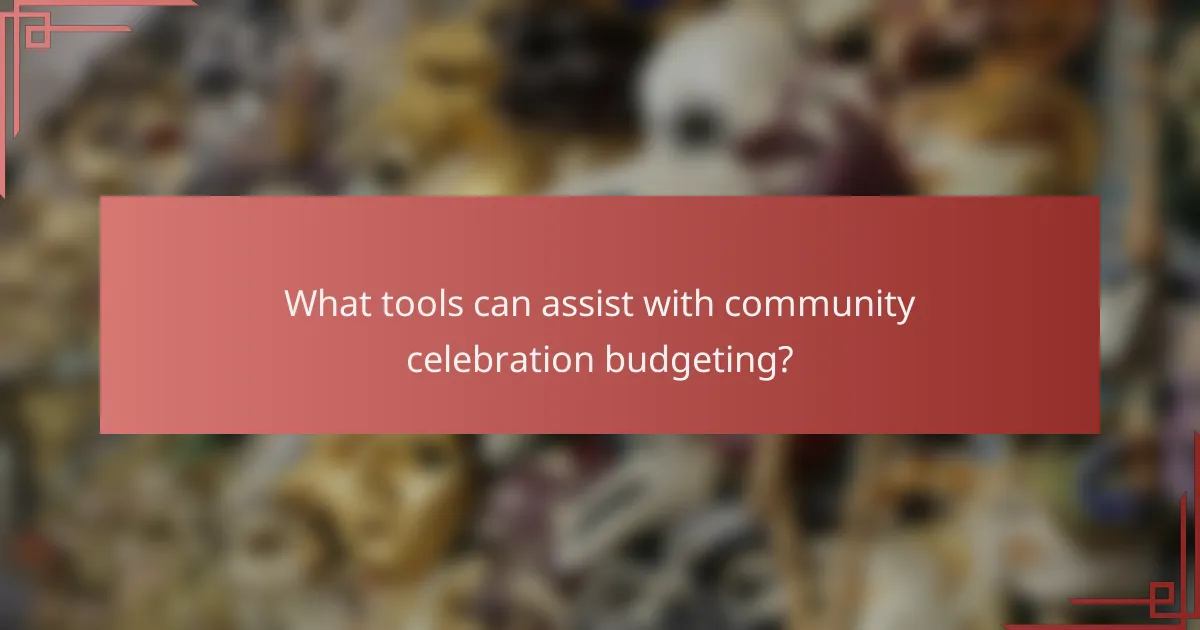
What tools can assist with community celebration budgeting?
Several tools can enhance community celebration budgeting by providing structure and clarity. Budgeting software, spreadsheets, and community engagement platforms can help track expenses, manage resources, and facilitate collaboration among organizers.
Budgeting Software
Budgeting software simplifies financial planning by allowing users to create detailed budgets, track spending, and generate reports. Popular options include QuickBooks, Mint, and YNAB (You Need A Budget). These tools often provide templates tailored for event planning, making it easier to allocate funds effectively.
When selecting budgeting software, consider features like real-time collaboration, mobile access, and integration with other financial tools. Many platforms offer free trials, so testing a few can help determine which best meets your community’s needs.
Spreadsheets
Spreadsheets, such as Microsoft Excel or Google Sheets, are versatile tools for community celebration budgeting. They allow for customizable budgeting templates, making it easy to track income and expenses, set financial goals, and perform calculations. Users can create charts and graphs for visual representation of budget data.
To maximize effectiveness, use formulas for automatic calculations and color coding to highlight critical areas. Sharing spreadsheets with team members can enhance transparency and facilitate collaborative budgeting efforts.
Community Engagement Platforms
Community engagement platforms, like Eventbrite or Facebook Events, can assist in budgeting by providing insights into ticket sales, donations, and overall participation. These platforms often include tools for managing RSVPs and tracking attendee contributions, which can help in forecasting revenue.
Utilizing these platforms can streamline communication and engagement, ensuring that all stakeholders are informed about financial goals and progress. This can lead to more successful fundraising efforts and a clearer understanding of the budgetary needs for the celebration.
